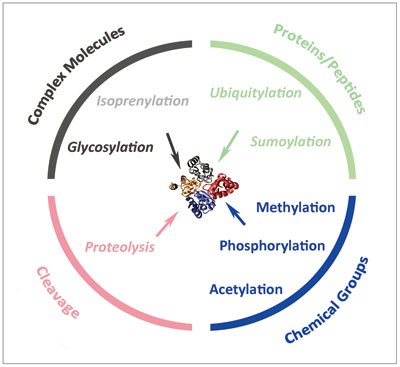Post-Translational Modification Proteomics Service
Post-translational modification (PTM) is a critical process in molecular biology. While the genetic code guides amino acid sequences during synthesis, PTMs add complexity by modifying specific amino acids. These modifications can reshape a protein's structure, function, localization, and interactions, yielding diverse proteoforms from a single gene. PTMs significantly contribute to the functional diversity of the proteome, influencing various cellular processes. At Creative Proteomics, our high-quality PTM proteomics service covers both qualitative and quantitative analysis, providing valuable insights into your protein research.
What is Post-Translational Modification
Absolutely, PTMs are like artists' brushstrokes that add intricate details to the canvas of molecular biology. The genetic code provides the basic blueprint during protein synthesis, but PTMs step in afterwards to sculpt and refine, adding layers of complexity. By modifying specific amino acids, PTMs become the maestros orchestrating changes in protein structure, function, localization, and interactions. This symphony of modifications results in an astonishing diversity of proteoforms emerging from a single gene, enriching the functional tapestry of the proteome. In essence, PTMs are the choreographers of cellular processes, influencing the dance of molecules in various biological pathways.

Fig.1 Schematic of PTM (Wang, Y. et al.; 2014)
Applications of Post-Translational Modification Proteomics
- Protein Function Research
Protein function research heavily relies on PTMs, with phosphorylation, acetylation, ubiquitination, and glycosylation acting as molecular switches. Modifications of serine, threonine, or tyrosine residues impact enzyme activity, protein-protein interactions, and subcellular localization. - Disease and Drug Research
Aberrant modifications are linked to pathological conditions like cancer, neurodegenerative disorders, and metabolic diseases. Drugs targeting specific proteins or pathways affected by PTMs offer a nuanced and precise approach to drug design, minimizing side effects and enhancing therapeutic efficacy. For example, inhibitors of enzymes responsible for certain modifications can be developed to modulate cellular processes. Targeting PTMs holds promise for advancing drug development and understanding cellular regulation.
Our Service
Leveraging our extensive experience and expertise in the field of proteomics, Creative Proteomics offers a full suite of high-quality post-translational modification proteomics services. These services are designed to meet a wide range of research needs and objectives, providing valuable insights into the systematic study of proteins. The services we offer include:
PTM Qualitative Analysis Service
PTM qualitative analysis is a critical aspect of proteomics, aiming to identify and characterize the specific modifications present on proteins rather than the number of modifications. It provides insights into the nature and diversity of PTMs within a biological sample with the identification of modified residues, the types of modifications, and the proteins carrying these modifications.
PTM Quantitative Analysis Service
While qualitative analysis provides a snapshot of the presence and types of PTM, quantitative analysis delves deeper by assessing the abundance of these modifications. Understanding the quantitative aspects of PTMs is crucial for unraveling dynamic cellular processes, as it allows researchers to measure changes in modification levels in response to different stimuli, conditions, or disease states.
Workflow of Post-Translational Modification Proteomics Service

Fig.2 PTM proteomics service workflow
Creative Proteomics brings a wealth of experience to the field of protein research. Our comprehensive services and products cover the entire spectrum of utilizing suitable and efficient gateways. Utilizing our proprietary platform, we have successfully implemented many proteomics research projects. If you are interested, please contact us for more information and a quote.
Reference
- Wang, Y.; et al. Protein post-translational modifications and regulation of pluripotency in human stem cells. Cell Research. 2014, 24(2): 143-160

